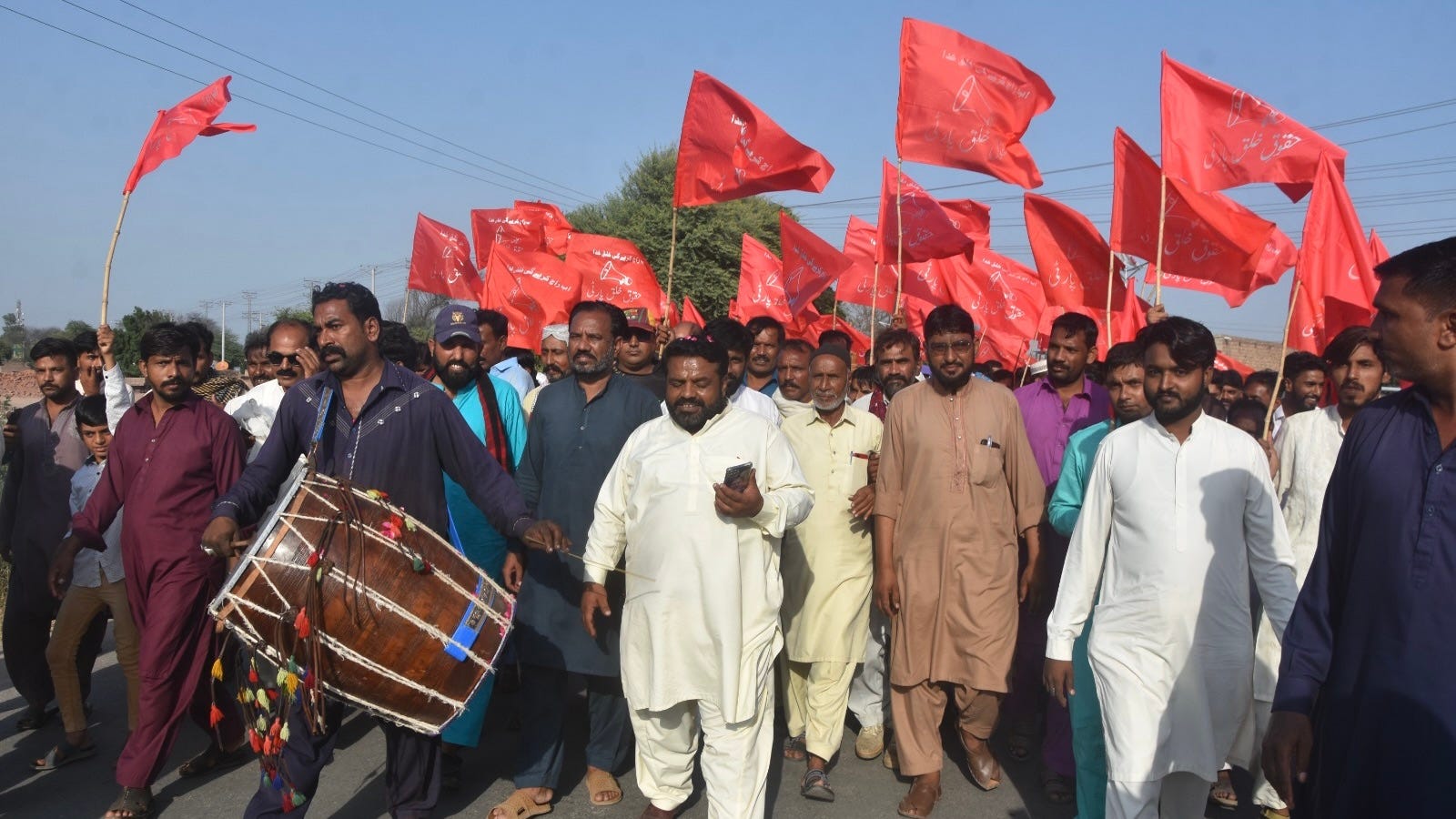Farmers in Pakistan Organise
Amidst Declining Economic Conditions Face Face Attacks on Their Livelihood
Thousands of farmers gathered in Jhang, Punjab on 6 October to participate in the Jhang Kisan conference organised jointly by the Pakistan Kisan Rabta Committee (PKRC) and Haqooq-e-Khalq party (HKP). The meeting was organised in order to bring together the analysis and demands of farmers’ movements in the region and to call on the government to take action in light of the declining economic conditions of the country’s farmers.
Thousands of farmers across Pakistan gathered in Jhang to demand fair prices for their crops and an end to corporate farming. They called for government support and reforms to protect small farmers.#JhangKissanConference@via_campesina @lvc_southasia @AsianPeoplesMvtpic.twitter.com/P0WLkUhPaq
— Pakistan Kissan Rabita Committee (@PKRC_Pak) October 8, 2024
Farmers and their families who participated in the conference raised their voices against the government’s betrayal of the interests of the majority in favour of corporations and private companies under the pressure of the International Monetary Fund (IMF).
Attended the Kissan Conference at JHANG organized by @Haqooq_e_Khalq and PKRC. People are fed up with the infighting of elites. The crowd was electrifying, raising slogans of AZADI. People rejected anti-Farmers, and anti-poor policies of the State and vowed to fight back. pic.twitter.com/IudWB0bknJ
— Haider Ali Butt (@HaiderSalma_) October 6, 2024
The major demands raised by the farmers were fixing a minimum support price (MSP) for all the farm products and increased government procurement.
Farmers in Pakistan have alleged that the government has been reluctant to control the prices of the inputs and are unwilling to buy the farm products at the correct prices in an attempt to push private players in the market.
Farooq Tariq, general secretary of the PKRC, claimed in a message to promote the Jhang Kisan conference, that the decision not to fix a MSP for agricultural produce was made under the pressure of the IMF, which similarly was the reason behind the hike in the prices of electricity and other inputs.
The government in Pakistan has reduced different kinds of subsidies available for farmers, forcing the majority of them to buy crucial inputs such as electricity and fertilizers at exorbitant prices pushing up the cost of agricultural production.
At the same time, its refusal to fit an appropriate minimum price for agricultural products forces the majority of small farmers, i.e. those who own less than 12 acres of land and represent 90% of the agricultural demographic in Pakistan, to sell their product at a disadvantaged price.
Farmers have argued that the government knows that its policies are negatively impacting farmers, and despite acknowledging the rise in the prices of input and overall production cost, it continues to list prices below their cost of production under pressure from market forces.
Due to the distress sale, farmers are often left with nothing to re-invest when the next crop season arrives. It also sustains a vicious debt trap as they are unable to pay back their existing loans, particularly in the light of reduction in government schemes to aid small and medium farmers.
On top of all of this, the Pakistani government has made repeated policy blunders such as earlier this year when it decided to import wheat at a time when the country was expected to have good production domestically. The move had sparked large farmers protests across the country in May.
Pakistan’s farmers face long term structural issues
According to the Food and Agricultural Organization (FAO), around 37% of Pakistanis are working in agriculture which has a GDP share of 23% and 70% of the country’s exports are directly and indirectly linked with the sector.
Despite its importance in the country’s economy, the necessary reforms in the country’s agricultural sector have been consistently denied by the ruling class. The country faces high inequality in land ownership. According to some estimates only 2% of people in Pakistan own around 45% of all agricultural land in the country. In other words, 98% of the country’s farmers own less than 55% of all agricultural land. The majority of the country’s farmers own around 12 acres or even less and lack the income to invest in the modernization required to raise the productivity of their land.
This is one of the major reasons for persistent poverty in Pakistan with over 40% of the people living below the poverty line. Successive governments in Pakistan have failed to push for land reforms in the country, by and large retaining the colonial land relations.
The country’s agricultural sector has also been negatively impacted by climate change in the last few years. Heavy rains and rising temperatures have endangered the cropping patterns and in some cases even wiped out some of the crops from the country’s agricultural map and made it difficult for the farmers to plan their produce in advance.
The floods in August 2022 which affected over 33 million people across the country and destroyed the farming communities along the big rivers in the country’s Punjab and Sindh provinces were one such instance, and may not be an aberration.
According to farmer’s groups, it is clear that issues faced by Pakistani farmers have become worse due to a combined effect of the misplaced policies adopted by the government and climate change. Therefore, there is a need for organised movement to save the livelihoods of the country’s majority.




